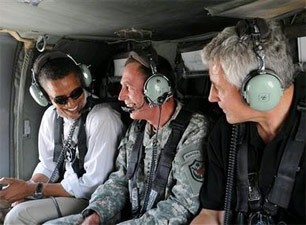The statement by Iraq's government spokesman, Ali al-Dabbagh, followed talks between Obama and Prime Minister Nouri Al-Maliki - who has struggled for days to clarify Iraq's position on a possible timetable for a U.S. troop pullout.
Al-Dabbagh said the government did not endorse a fixed date, but hoped American combat units could be out of Iraq sometime in 2010. That timeframe falls within the 16-month withdrawal plan proposed by Obama, who arrived in Iraq earlier in the day as part of a congressional fact-finding team.
"We are hoping that in 2010 that combat troops will withdraw from Iraq," al-Dabbagh told reporters, noting that any withdrawal plan was subject to change if the level of violence kicks up again.
Obama made no public statements following the talks with al-Maliki and President Jalal Talabani in Baghdad's heavily protected Green Zone. Obama also plans meetings with U.S. military commanders who will outline recent progress in the war he has opposed from the start.
This was the third stop on a foreign tour designed to gather information while burnishing the Democratic contender's foreign policy credentials. National security issues are the one issue area in which Obama trails Republican John McCain in the polls.
The Iraqi government comment on troop withdrawals could be embraced by the Obama campaign, but may irritate White House officials. The Bush administration has refused to set specific troop level targets and only last week offered to discuss a "general time horizon" for a U.S. combat troop exit.
The Iraqi stance also is another wrinkle in a confusing series of remarks and denials in recent days.
Al-Maliki was quoted last week by the German magazine Der Spiegel appearing to endorse Obama's 16-month timetable. The Iraqi leader's aides have since said his comments were misunderstood, and he is not taking sides in the U.S. election.
The U.S. military also took the unusual step of translating and distributing the Iraqi government reaction to the Der Spiegel article.
The meetings with Iraqi officials came after Obama began his first on-the-ground inspection of Iraq since launching his bid for the White House.
It marked the second major leg of a war zone tour that opened in Afghanistan. The contrasts in tone and message were distinct.
Obama sees the battle against the resurgent Taliban and al-Qaida in Afghanistan as America's most crucial fight and supports expanding troop strength there to counter a sharp rise in attacks.
But Obama had opposed the Iraq invasion and now worries that an open-ended U.S. combat mission here will sap military resources and focus - at a time when Iraq violence has dropped to its lowest level in four years.
The Illinois senator - traveling with Sens. Jack Reed, D-R.I., and Chuck Hagel, R-Neb. - arrived first in the southern city of Basra, the U.S. Embassy said.
Basra is the center for about 4,000 British troops involved mostly in training Iraqi forces. An Iraqi-led offensive begun in March reclaimed control of most of the city from Shiite militia believed linked to Iran.
His meetings in Baghdad were expected to include the top U.S. commander in Iraq, Gen. David Petraeus, and other military chiefs outlining the significant gains in recent months against both Shiite militia and Sunni insurgents including al-Qaida in Iraq.
The White House and military leaders - and many residents of Baghdad - trace the momentum back to last year's buildup of more than 30,000 troops in areas around Iraq's capital. McCain has tried to hammer Obama on his criticisms of that military surge.
In an interview Monday on ABC's "Good Morning America," McCain said he hoped Obama would now "have the opportunity to see the success of the surge."
"This is the same strategy that he voted against, railed against," McCain said. "He was wrong about the surge. It is succeeding and we are winning."
All five surge brigades have left Iraq, but there are still about 147,000 U.S. soldiers in Iraq, more than in early 2007.
Iraqi leaders also pressed Obama for more clarity on his long-term vision for relations with Washington. Such discussions have added importance since Iraq and U.S. negotiators appear stalled in efforts to reach a long-range pact to define future U.S. military presence and obligations.
American diplomats hoped to reach a final accord by the end of the month, but it now seems the goal is a stopgap "bridge" document that would maintain the status for U.S. forces once a U.N. mandate on their presence expires at the end of the year. Such as move would leave the hard bargaining to the next president.
Obama arrived following talks Sunday in Kuwait with the emir, Sheik Sabah Al Ahmed Al Sabah. Earlier he met with U.S. military commanders and troops in Afghanistan and held talks with President Hamid Karzai.
He is scheduled to go on to Jordan, Israel and European capitals.

In this photo released by the U.S. army, U.S. presidential candidate Barack Obama, left, top U.S. military commander in Iraq, David Petraeus, center, and U.S. Senator Chuck Hagel, R-Neb, ride inside a helicopter in Baghdad, Iraq, Monday, July 21, 200
http://accesswdun.com/article/2008/7/211705
